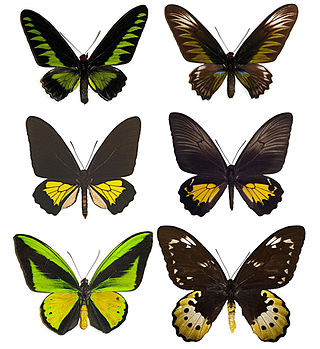
Birdwings are butterflies in the swallowtail family, that belong to the genera Trogonoptera, Troides, and Ornithoptera. Most recent authorities recognise 36 species, however, this is debated, and some authorities include additional genera. Birdwings are named for their exceptional size, angular wings, and birdlike flight. They are found across tropical Asia, mainland and archipelagic Southeast Asia, and Australasia.

Troides minos, the southern birdwing, also called Sahyadri birdwing, is a large and striking species of swallowtail butterfly. It is endemic to southern India. With a wingspan of 140–190 mm, it is the second largest butterfly of India. It is listed as Least Concern in the IUCN Red List.
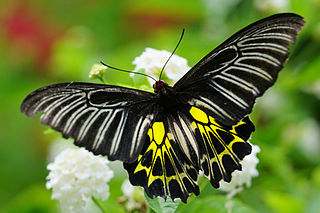
Troides aeacus, the golden birdwing, is a large tropical butterfly belonging to the swallowtail family, Papilionidae.

Troides helena, the common birdwing, is a butterfly belonging to the family Papilionidae. It is often found in the wildlife trade due to its popularity with butterfly collectors. The butterfly has seventeen subspecies.

Papilio clytia, the common mime, is a swallowtail butterfly found in south and southeast Asia. The butterfly belongs to the subgenus Chilasa, the black-bodied swallowtails. It serves as an excellent example of a Batesian mimic among the Indian butterflies.

Luthrodes pandava also called the Plains Cupid or cycad blue, is a species of lycaenid butterfly found in South Asia, Myanmar, United Arab Emirates, Indochina, Peninsular Malaysia, Singapore, Taiwan, Java, Sumatra and the Philippines. They are among the few butterflies that breed on cycads, known for their leaves being toxic to most vertebrates.

Colotis amata, the small salmon Arab, is a small butterfly of the family Pieridae, that is, the yellows and whites. It is found in Africa and Asia. Adults are fond of smaller flowers for nectar and often fly low along the ground in search of wildflowers.
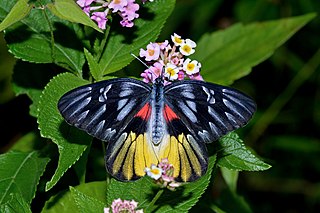
Delias acalis, the redbreast Jezebel, is a medium-sized butterfly of the family Pieridae, that is, the yellows and whites.
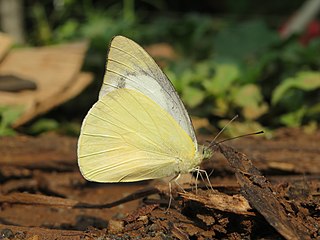
Appias albina, the common albatross, is a small butterfly of the family Pieridae. It is found in south and southeast Asia to Australia.
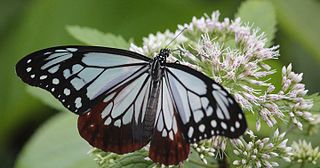
Parantica sita, the chestnut tiger, is a butterfly found in Asia that belongs to the crows and tigers, that is, the danaid group of the brush-footed butterflies family.

Cethosia cyane, the leopard lacewing, is a species of heliconiine butterfly found from India to southern China, and Indochina. Its range has expanded in the last few decades, and its arrival in the southern part of the Malay Peninsula, including Singapore, is relatively recent.

Jamides celeno, the common cerulean, is a small butterfly found in Indomalayan realm belonging to the lycaenids or blues family. The species was first described by Pieter Cramer in 1775.

Symbrenthia lilaea, the peninsular jester, is a species of nymphalid butterfly found in South Asia and Southeast Asia. It forms a superspecies with Symbrenthia hippoclus. There are numerous regional forms in a poorly resolved taxonomy.
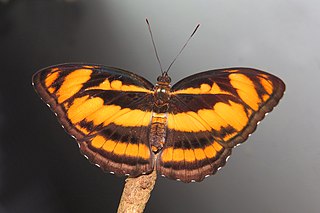
Athyma nefte, the colour sergeant, is a species of brush-footed butterfly found in tropical South and Southeast Asia.
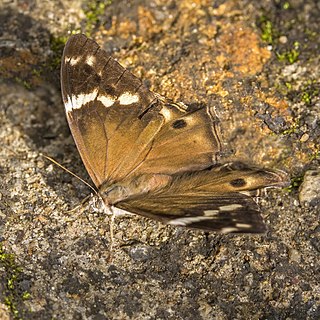
Lethe drypetis, the Tamil treebrown, is a species of Satyrinae butterfly found in south India and Sri Lanka.
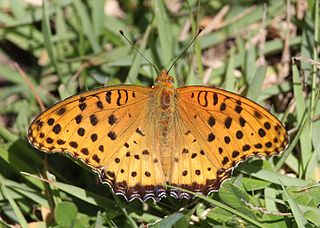
The Indian fritillary is a species of butterfly of the nymphalid or brush-footed family. It is usually found from south and southeast Asia to Australia.

Doleschallia bisaltide, the autumn leaf, is a nymphalid butterfly found in South Asia, Southeast Asia, and Australasia. In Australia it is also known as the leafwing.

Ornithoptera paradisea, the paradise birdwing, is a species of birdwing butterfly found in New Guinea.

Troides haliphron, the haliphron birdwing, is a birdwing butterfly confined to Sulawesi and the lesser Sunda Islands.

Troides amphrysus, the Malay birdwing, is a birdwing butterfly in the genus Troides in the family Papilionidae.























